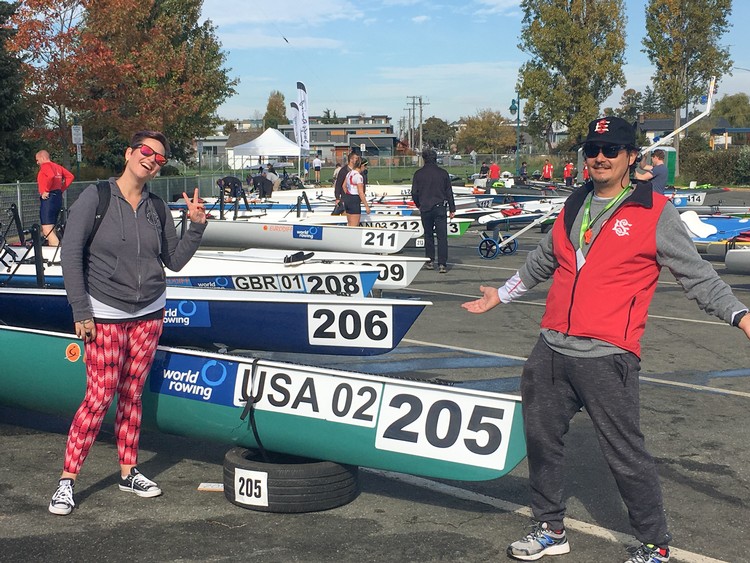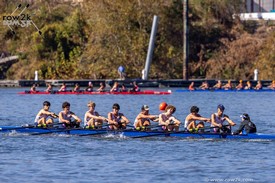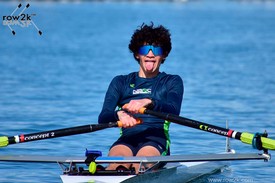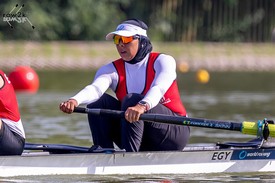Ed Moran, row2k.com

Oliver Gajda doesn't have time to develop the rowing skills and put in the training time it would take to compete in an international regatta, certainly not a World Rowing Championships - and not at 47, even if he has been an athlete most of his adult life.
The sports Gajda favored are done in winter, and on snow. He competed in cross-country skiing all through high school and then transitioned into back-country skiing in college. He didn't even begin rowing until five years ago when shoulder surgery, and a protracted recovery off the snow, led him to the South End Rowing Club in San Francisco, and into a brand-new sport - open water rowing.
Even then, Gajda didn't have a thought of trying to row in an international rowing championship. But, when Sidney, Canada, was named the host venue for the 2018 World Coastal Rowing Championships, Gajda saw an opportunity to start a career in international coastal rowing.
He was a member of a club that already rowed boats designed to be raced in open water conditions, mostly in bays and on open ocean courses. He already knew how to read tides and winds, how to row through rough surf, how to maneuver a boat around a buoyed course that started and ended on a beach. So, he went for it.
Gajda helped pull together a group of about 10 athletes from the San Francisco Bay based club and last fall raced in the 2018 World Coastal Rowing Championships.
Now he is hooked and is hoping to race in the 2019 World Coastal Rowing Championship next October in Hong Kong. For Gajda, racing internationally as a coastal athlete is a window that is open to him now. But it is one that he thinks will close quickly as if FISA continues to develop the sport, and decides whether to try and have it introduced onto the Olympic schedule.

"This is going to be my last kick at the can," Gajda said. "I really do see this taking off. The event they ran up in (Canada) was amazing. For me this compares to mountain biking in the 70s, or snowboarding in the 80s, both new sports that were just getting going and open. I really do believe that this could be heading to the Olympics.
"Right now, there is still that feeling that (traditional international two-thousand meter) rowing is the only real type of rowing, and it can't be anything else," he said. "I think that is going to change."
He may be right.
Over the past two Olympic cycles, the pressure from the IOC to reach gender equity at the Olympics, to reduce costs to host countries, and increase interest by developing new events - like surfing and rock climbing and skateboarding which will debut in Tokyo in 2020 – resulted in FISA eliminating all but two lightweight events in the Olympics and to give serious consideration to adding coastal rowing to its future Olympic proposals.
FISA executive director Matt Smith told row2k that the organization sees the IOC pressure coming from"many angle" including the "cost and complexity of Games, which is challenging for potential host cities, growing the attractiveness for younger audiences, and staying competitive for screen time on leading television channels which seek a wide demographic audience for their investments.
"The IOC is adjusting strategy to keep the Games and the movement in line with the trends of society. This results in pressure on all stakeholders, including the International Federations, to adjust and react. World Rowing is very supportive to help the IOC to create a continuously thoughtful model because successful Games mean so much for the success of rowing," Smith said.
"We want rowing to maintain its strong position long-term within the Olympic movement and the Olympic sport programme. Some hard decisions have already been made, and there will be more to come as the IOC and the sports move through this continuously changing landscape."
For rowing, the two areas that could see the most chance of being included as a new event in future FISA Olympic proposals include indoor and coastal rowing. Indoor rowing has already grown to the point that there is now a FISA run and sanctioned World Championships, and the US will run its first national championship Feb. 24 in Long Beach, California in conjunction with the world event.
As for coastal rowing, USRowing is partnering with Rowing Canada to develop and promote up to five events this year in the US.
"We're 100 percent behind coastal," USRowing CEO Patrick McNerney said during a recent interview. "It's been an initiative that I know USRowing and the rowing community has discussed for many, many years."
Indeed, during the Rio quadrennial, USRowing had begun initiatives to introduce new coastal rowing events to the association's domestic competition schedule. But those plans never really gained significant momentum.
After leaving the Rio Olympics with just two medals the association began focusing on what it needed to change for the 2020 cycle and plans and the coastal rowing plans fell to the way side.
But the pressures from the IOC to eliminate the men's lightweight four and reduce overall lightweight rowing to two sculling events, the men's and women's lightweight double, and the possibility that all lightweight rowing will be eliminated from the next FISA proposal, has pushed developing of alternative events, like coastal rowing, to the forefront of planning for the rowing community.
"Two years ago, whatever initiatives that were in place that USRowing would have been working on were deprioritized based on other identified priorities," McNerney said. "But, with the evolution, or with the need to evolve our sport, and to make our sport more relevant, coastal is one of those disciplines that we need to embrace, and we have embraced."
Current Planning
USRowing's John Wik was involved in the earlier, and then scuttled, plans to begin the development of coastal rowing, but he is back at the helm, and late last year, he was given the green light to begin again.
As part of that, Wik is working with Rowing Canada to develop and promote as many as five coastal events in 2019 in Boston, Chicago, San Francisco, Sarasota, and Seattle.
Planning for those events is in the early stages, and while desired locations have been identified and local organizing committees formed, only one event has a set date. That event will take place in Sarasota, Florida, at South Lido Park, November 20-24.
If planning a new rowing event is complex for traditional two-thousand meter events, it's even more complex for an event that is still being defined in the US and Canada.
Coastal, or open ocean rowing, is not new. There are established clubs that host races and feature crews rowing in traditional wooded boats or in other composite ocean sculling boats.
FISA has held a Coastal World Championship since 2007. The event features four boat classes, including singles, doubles, mixed doubles, and coxed quads. The boats used in those competitions meet a standard size and weight, and are not readily available in the US and Canada.
Just getting boat manufactures to make equipment available for US events is a challenge, Wik said. In addition to equipment, developing rules and guidelines, locating venues and then funding and promoting the events is going to take time and energy.
To tackle these issues, Wik has been tasked by USRowing to form a planning committee, which came together at the most recent association Annual Convention in San Diego.
"One of the biggest problems that we are having is with equipment," Wik said. "We don't have enough FISA class coastal boats in the US at this point to support a lot of these events, so we have been working with the manufactures to see if we can find coastal boats and figure out an appropriate way to bring those boats to these events.
"We're moving right along," he said. "I've spoken with some of the manufactures, and there are boats in the United States. But there are only a small number of them."

Wik said while there is a market for open water racing and recreational shells, there has not been a athlete market for FISA standard boats and there are currently not enough of the international standard boats available.
"To create a new sport, we have to have enough athletes for critical mass, and we don't have that right now," he said. "People are going to have to use FISA class boats as part of this and we have to make sure that we have enough FISA class boats for the athletes to use so they can be competitive."
For now, Wik said, the events are going to be open to several boat classes and levels of competition, at least as the sport is being developed.
"There are other classes of boats out there, and what we have decided to do is have two events at each of these regattas. We will have the FISA class events, and then we will also have open class events that will allow non-FISA class boats. But they will be in their own class."
Wik said the goal for this year at the targeted events will be to attract both traditional open water clubs and athletes hoping to break into international racing. "We're hoping to attract people from the various regions. It's a brand-new sport and we need to create some interest," he said.
Today
For now, the idea that coastal rowing could become an Olympic sport will not be seriously addressed by international rowing federations until after the conclusion of the 2020 Olympics.
It is being openly discussed, for sure, and many in the rowing community believe that when FISA convenes the next Extraordinary Congress in Japan, the complete elimination of lightweight rowing events and the inclusion of a coastal event as an exhibition will be on the table for 2024.
But, funding levels for international federations is solely dependent on winning medals. And that is where the high-performance focus and funding for both USRowing and Rowing Canada will remain.
"Our high-performance funding is targeted toward two-thousand-meter rowing," said Iain Brambell, Rowing Canada's director of high performance. But having stated that, Brambell said he is very aware of the changes traditional rowing has already undergone, and is currently facing, and that coastal is a serious consideration for the health and future of the sport.
"I am a three-time Olympian in the lightweight four, which is gone by the wayside," Brambell said. "I think I certainly have been watching the changes keenly. It's challenging when you see an event you raced in at the Olympics no longer exists.
"Looking across the decisions the IOC has made in other sports, and other programs, it's really important that we do start innovating in our sport and examining change. Whether that's coastal rowing, or something else, we need to take a good inward look. It's absolutely needed and healthy for our sport.
"And with coastal, we're really on the beginning edge of that. We had the good fortune to host the World Rowing Coastal Championships this past fall, and that showed a lot of excitement and interest.
"It was a great venue to watch the racing, but ultimately, our funding is predominately based on the Olympic program and the Paralympic program. And with coastal not represented there, we are not supporting it from a high-performance perspective.
"It is one area where we are watching," he said. "We're an endurance based sport at the moment, but is that something that we are going to keep focusing on? Certainly, it's expensive to have a 2000-meter course from a venue point of view, that doesn't mean that we shouldn't.
"There are things we should consider," he said "Are there things that have been done at the youth Olympics that we should be trying at the senior level - things like relays, shorter distance racing, racing around buoys? We should look into that. I don't think we should focus on one area. On coastal, I don't think it's a silver bullet answer.
"But I do think there are areas we need to be more courageous about exploring and I think it's time we do that. We certainly owe it to the sport."
The Future
At USRowing, the focus of the 2020 Games is winning medals in the events that currently exist. But looking ahead is also a priority. The pressures on the sport to change are real, said McNerney.
"It's important for us to think about how we have traditionally viewed rowing," he said. "Rowing is traditional Olympic sport in that we've been in the Olympics since 1904, and I think what we're advantaged by is the fact that we're a traditional sport.”
McNerney said that the idea that because rowing is a traditional sport it does not need to make fundamental changes, or introduce new events is not a viable way to view the future of the sport.
"That doesn't work anymore,” he said, “and for rowing to evolve, and to evolve outside the bubble, we need to be creative and embrace opportunities to broaden the scope of rowing. Coastal is just one of those."
Coastal rowing has been part of USRowing future planning since McNerney was named CEO in 2017.
"It's been an ongoing discussion since I joined USRowing," he said. "If we are going to continue to be relevant, if we are going to continue to be an Olympic sport we need to seriously address how we position ourselves and our format.
"As FISA considers what the future Olympics, 2024 and onwards will look like, there is serious consideration to include coastal into the Olympic program."
IOC Pressure to Change
While FISA has not made a public decision to eliminate lightweight rowing completely, the IOC has mandated that the number of athletes competing in the Sumer Games will be capped. "Right now, there is already a challenge that the IOC must address to approve a format that is capped at 10,500," McNerney said.
And the idea that lightweight rowing will remain on the schedule while reductions are being made across all sports is not realistic, McNerney suggests.
"The handwriting is on the wall," he said. "In the context of the Olympics, and where it's going, it's going to be a tough challenge to secure approval from the IOC to support the continuation of lightweights.
"That's not a USRowing decision, that's not a national federation decision, and it's not even something FISA can really defend at this point. The handwriting is on the wall, as hard as it is say that. I think what we have to recognize is, Olympics are a business."
And from strictly a business standpoint, traditional rowing is expensive to host given that Olympic regulation venues don't readily exist in every possible bid city, and are either mostly located a problematic distance from the actual host city, or must be developed from scratch.
These issues will continue to impact the future of rowing, and pressure the international rowing community to find ways to increase interest and revenue. In that the IOC has been clear.
And FISA is trying to react without scraping the traditions and disciplines of the sport that has historically driven its success.
"The IOC announced (in July) that not only will the 28 core Olympic sports have to reduce quotas to bring the number of competitors at the Games down from 10,616 in Tokyo to 10,500 for Paris 2024, they also have to include "two or three" additional sports expected in 2024, possibly adding up to 300 quota places that must be taken from the 28 core sports for Paris 2024," FISA's Smith said
"The IOC seeks to add new sports or disciplines that will have a greater interest for younger audiences and host cities. If you look at the list of the quota places among the 28 core sports, rowing, at number 4, is a low hanging apple for reductions if we stay static," he said.
Does that mean sweeping changes to the fundamental aspects of traditional rowing? Smith said no.
"However, we do see an opportunity to increase the attractiveness of the Games with a new discipline of our sport, which is dynamic and picturesque - coastal rowing," Smith said.
"Our contact with leaders of the IOC, both official and unofficial, indicate that there is a positive reception for new disciplines of sports that add value and are potentially attractive for youth but do not add more "venues" and cost to the Games."
A Closing Window
Out in San Francisco, Oliver Gajda, and his teammates, are watching these developments closely, and he really does think his window to be an international athlete will only be open for a period of a few years.
"It was exciting to be in Canada last fall," Gajda said. "This is a coming sport, and we're hoping it hits the Olympics. Truth be told, I'm 47, going on 48, and recovering from shoulder surgery, and I had a snowball's chance in hell of ever racing at a world championships. This was my one opportunity.
"I may have one or two more years to actually do this," he said. "Because once it takes, off there is going to be a much younger, stronger and more competitive field coming into it. And I really believe this is going to take off."

If you enjoy and rely on row2k, we need your help to be able to keep doing all this. Though row2k sometimes looks like a big, outside-funded operation, it mainly runs on enthusiasm and grit. Help us keep it coming, thank you! Learn more.
Comments | Log in to comment |
- Bont Rowing
- Calm Waters Rowing
- Concept 2
- Craftsbury Sculling
- The Crew Classic
- CrewLAB
- Croker
- Durham Boat Co.
- Empacher
- Faster Masters
- Filippi
- Fluidesign
- h2row.net
- HUDSON
- Live2Row Studios
- Nielsen-Kellerman
- Oak Ridge RA
- Peinert Boat Works
- Pocock Racing Shells
- Race1 USA
- RowKraft
- Rubini Jewelers
- Vespoli USA
- WinTech Racing
- Bont Rowing
- Calm Waters Rowing
- Concept 2
- Craftsbury Sculling
- The Crew Classic
- CrewLAB
- Croker
- Durham Boat Co.
- Empacher
- Faster Masters
- Filippi
- Fluidesign
- h2row.net
- HUDSON
- Live2Row Studios
- Nielsen-Kellerman
- Oak Ridge RA
- Peinert Boat Works
- Pocock Racing Shells
- Race1 USA
- RowKraft
- Rubini Jewelers
- Vespoli USA
- WinTech Racing


















12/10/2019 9:44:36 AM
11/13/2019 1:56:35 PM
12/10/2019 9:38:23 AM
01/11/2019 2:28:46 AM
01/10/2019 12:50:39 AM
01/09/2019 1:58:35 PM